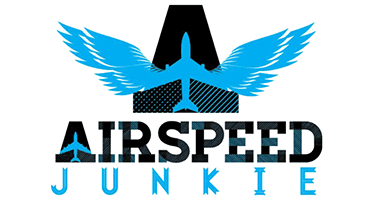This article is meant to take a deep dive into the concept of Captains authority. It could be well argued with great emotion that captain’s authority on the flight deck has greatly decreased. If you fly the line long enough you have no doubt heard countless takes on various views of the loss of input.
Taking the emotion out of the topic is the key to an effective discussion between upper management and airline pilots. This has to be constructive, and to effectively address the subject we have to clearly define some old concepts and introduce some new ones. The key is to have a dialogue that both crews and management understand by laying out the facts and new theories and innovations that change what we as airline pilots may understand. This could commonly be defined as a paradigm shift and to be honest with you, it is very exciting. Here we go.
If you read social media pages or just have normal conversations in the cockpit, you would think that there is the almighty wizard behind the curtain manipulating airline schedules, quality of life and standard operating procedures in the airline industry. Someone or something that is pulling the strings of the company to manipulate every aspect of airline pilots trips or schedules for the benefit of that company. Part of the problem is that the internet doesn’t have much of a filter and people can basically blow off any kind of steam they want to, without any kind of retribution.
One hotly debated issue revolves around airline pilots experiencing a perceived decrease in captain's authority. This perception, once confirmed by another pilot, solidifies into reality, emphasizing the significance of perception as the defining factor in shaping reality. In other words, perception becomes reality especially when its validated by others either in a discussion or something written.
More and more airlines are taking flight crews out of the decision making matrix. They do this by automating certain procedures, such as boarding and deplaning, route planning, changes in flight altitudes, extended operations and the like. This is perceived as a reduction in captains’ authority and takes the decision away from Flight Crews. (we will look at why in a few moments) and as a reduction in flight safety.
Obviously there are a lot of decisions to be made on any route, some of those decisions nobody really cares about anyway because it’s one less thing to manage. However, there are some people that want to be in control of everything, and that is not what this article is about.
In order to look at the solution and innovation to this problem or perception its important to look at the historical view of it first.
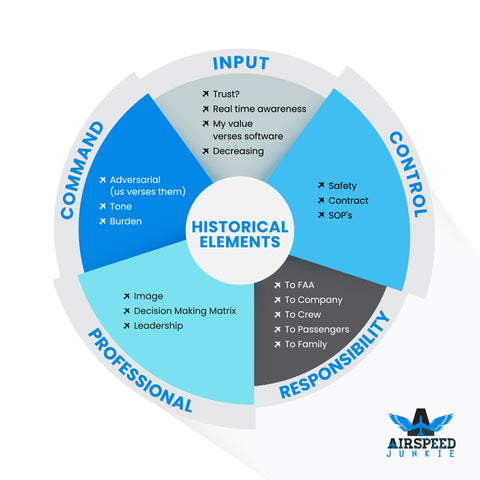
Videos are added narrative to the text
At first glance the graphic may seem normal or even traditional to you as a pilot. The aspects on the outside all are part of the traditional captain’s authority mindset. Keep in mind, this has never really been taught as a whole concept, it has been more or less shaped by one another in response to events in our careers, either good or bad. Lets look at each quadrant of the graphic and expand on them. This graphic is meant as more current day to day understanding of the dynamic of captains authority. We will use it to make changes or ideas with suggestions.
Control
Control consists of safety of flight items, operation of the aircraft and its crew in accordance to the collective bargaining agreement as well as the companies standard operating procedures. It has long been championed that the airline captain oversees all of this in the day to day operation of the trip. Not many would argue with this concept since its been a staple in the life of anyone in charge or command of something.
Input
The input section covers trust, real time awareness and the value of a pilot. This is the area where most pilots feel that their input is less valued. I am not here to argue for or against this notion, but its clear there are some things out there that are replacing some of the decision making elements. When a pilot feels like their input is not welcome nor valued, it always leads to some sort of growing problem. This can lead to safety issues or just a growing lack of caring over the long haul of one’s career.
Command
Command or commonly known as Pilot in Command represents that there is a singular leader of a crew. A person who takes responsibility for any outcome and leads their crews. This can be directed by tone, whether good or bad, and with a healthy or adversarial technique. (we all have seen this) It should also be pointed out that command also does bear a burden, since its responsibility to the core value of any airlines is safety. (more on that later)
Professional
There is an image of the professional pilot and captains are generally expected to lead by example. Really good leaders bring out the best of their crews and multiply their talents making them better people and better crew members. Terrible leaders diminish the ability of anyone shining or growing in their talents because they are fighting to just stay mentally healthy when they are around them.
Responsibility
There is not much argument that the airline captain bears the responsibility of the flight and is more or less held accountable to the FAA, the company, their fellow crew members, to passengers and also to their respective families. It also noted that the increased responsibility is part of the reason the pay the left seat is more than the right.
Historical or Modern?
This dynamic has been around for years and we have all played our part in operating inside the dynamics of this example. You may be surprised to know ,that airline management also knows the culture of this model and how to work in its present day scenarios. Change and growth have to be so carefully constructed it can be compared to walking on egg shells. So how does real and meaningful change happen? There is more to explore before giving an answer.
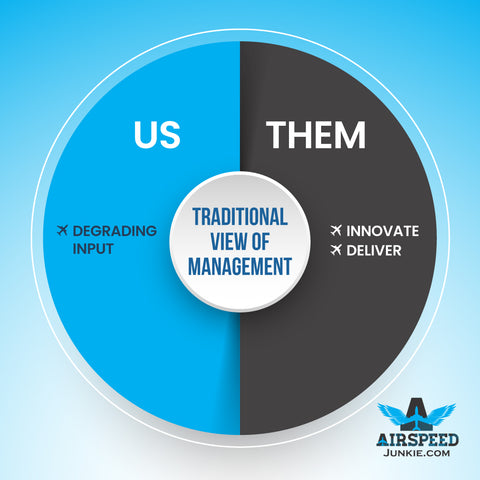
Although most people may not say the dynamic of this graphic is alive and well today, all would agree it has been a big part of airline history, especially with the FAA. We feel like that there is this line down the middle of airline life that consist of us versus them. The us would be flight crews and them would be airline management. Although it's fun to think that this is what is really happening today, it's not. Most airline managements just do not have time to play this game, and we need to officially say it outloud so that we can move forward.
One reason for the view is as we stated before that pilots feel like their input is degraded. However, there is one fact that most flight crews don't understand. This is the fact that airline management is under a lot of pressure to innovate and deliver an improving product over time. Once you understand that concept, it becomes a little easier to put the pieces of the puzzle together and that's what we're going to do next.
The second reason is a bit more complex. Lets use an example of a pilot with ten years of seniority who is a line holder. At this point this pilot could be looking at whether his/her future is the brightest with their current airline. Most have looked hard at the fact of jumping ship and going to another airline and basically starting over for a better long term solution. These pilots are conflicted, they have tough choices to make and are more or less fully invested in the airline that they have ten years seniority with.
Often airline management comes and goes which is common in the aviation business. That new VP or CEO most likely does not have the ten years of invested service and if their performance is not up to par with the airline, they are replaced or move on. It's not an ideal match because pilots feel stuck at this point where the manager or VP can simply move on. They may or may not know their performance makes a difference in the line pilots life, but for them, it may not be their final destination. For pilots, ten years seniority equates a final destination airline. This creates a natural divide.
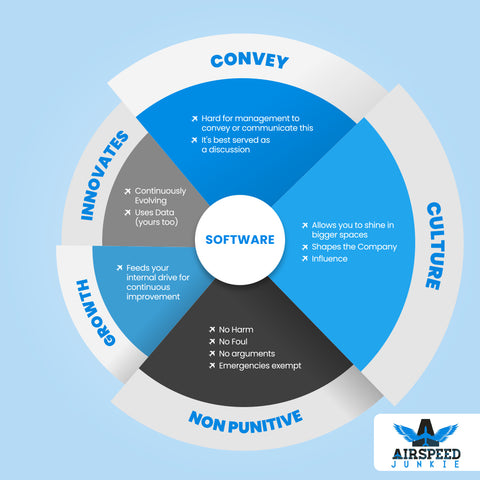
Videos are added narrative to the text
Software
If you operate in the modern day airline environment undoubtedly you have seen the increased use of software. And if you keep up with current events this is only going to become more and more critical because airlines are always pursuing a razor thin margin. On this graphic you will see several key factors of the software matrix, let's explore them. Hopefully you will begin to realize that software is not a dirty word but a critical part of the future of airline operations.
Innovates
Software continuously evolves and improves. No doubt artificial intelligence will have a big part of that in the future. Software uses data to improve. A lot of times crews don't realize that it is their data that makes the software better. (not personal data, but the data that comes from what you see and report)
Non punitive
It's pretty hard to hurt softwares feelings because it has none. Not following the software’s suggestions doesn't hurt anyone, and there's no accountability. You can follow suggestions made by software such as changing flight altitudes changing cost indexes or changing routes based on favorable winds or you can do what you want. The software doesn't care.
Growth
This one may be hard to explain to most pilots until you wrap your arms around it. There is a concept of following the software that can actually cause internal growth as a leader. Most pilots that I know have this internal drive for continuous improvement. Software gives you guidance on how to save fuel for example, and you can measure this instantly at the end of a flight.
You are now controlling an aspect of the flight with your decision making. This is in contrast to the typical view of degradation of input. And for some people it can be very invigorating to compete with themselves for a new personal best. There are other areas besides the fuel savings example.
Culture
This is another one of those hard to explain topics to understand how software helps culture. It will most likely take you the rest of this article or course to figure out how this works together with culture.
Using software allows you to shift your focus to bigger and more important spaces that you can have a huge impact on. We will expand on this more shortly. But there is a influence factor here that software creates for you to be influential, and it's exciting to think about.
Convey
To convey all the thoughts of this article and weave them into the new direction for airline operations and environments is very difficult to convey by management to line pilots. Oh sure, you can send out an e-mail, but the language of that e-mail cannot always give a positive message. Sometimes a one one conversation is much better because you can read body language and interpret passion in the way that someone explains it.
Emails or written updates fall short of the real voice of the message. This has always been any real effective leaders greatest challenge, how to communicate effectively.
A necessary look at emergencies for reference
But lets take a pause and discuss inflight emergencies and how they are viewed as part of this conversation.
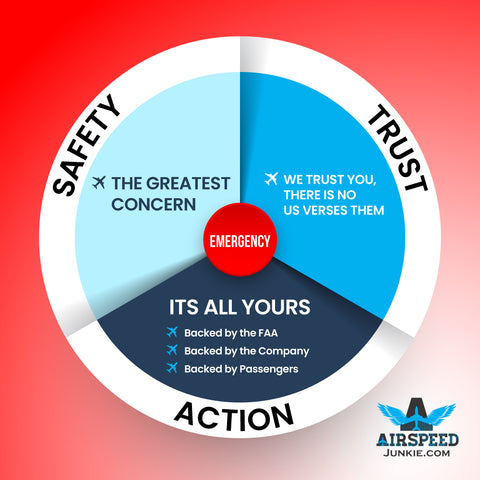
Videos are added narrative to the text
Emergencies
Before moving on, its important that everyone agrees on the concepts of emergencies. Its also important to say that I think in the airline industry this concept is common practice since this has been the focus on training for decades. However, it’s important to say first before getting to the new improved captains authority matrix.
Emergencies happen every now and then and no one would ever argue over how that emergency is dealt with. The immediate action needed to be taken gives the captain power to more or less do whatever it takes to have a positive outcome. This is backed by the FAA, its backed by the company and its backed by passengers too. It’s all yours and no one is going to tell you what to do, it is what you have trained for. The bottom line that should be conveyed is…we trust you.
Now that we have some of the basics stated and discussed lets move on to the new era of captains authority. If you take some time to think through these concepts, you may be very encourage to know that you have much more input and impact than you think you ever would have. It will just take each individual captain to decide to rearrange traditional thoughts on the subject.
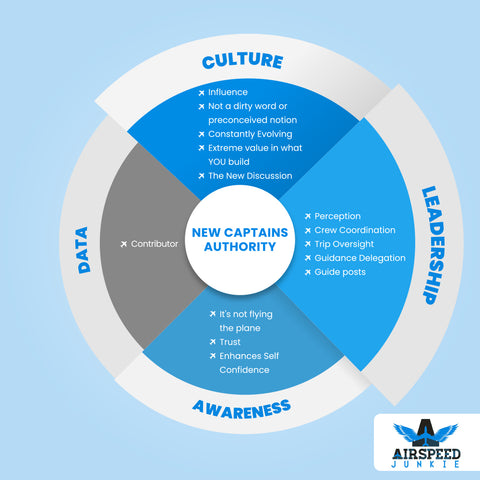
It is important to note that this discussion is captain to captain. It is not influenced by airline management whatsoever. That fact makes it more powerful and hopefully more credible. A lot of these concepts get their best value in a group discussion. Discussion is healthy and allows input so it make take you some time to absorb all of this on your own.
Data
There is a new era of data and its importance to any company. If you have noticed in the past there have been several large companies such as Facebook, Google, Amazon, and many more that have taken the art of data collection and made it an immensely powerful tool. You do not have to be an immense corporation to follow the lead of collecting data.
Data makes the world go round. The company desperately needs data, all kinds of it, good and bad. It can be things you notice, habits of ATC, a routine that dispatch does, runways that get closed, weather habits at certain airports and so on. The number of data points is endless and the company needs as much as they can get. This gets put into the software which in turn makes the software smarter, which in turn makes the company save more and more money thus becoming more profitable. You as the captain are an integral part of this plan, valued like never before. I used the word valued on purpose.
This concept is hard for management to convey, but it is urgent and any upper level manager worth their salt understands that you are the key to better data. How does that make you feel?
Awareness
Captains can now viewed as thought leaders and contributors like never before. Have you noticed how the FAA is shifting from a mentality of management over performance? If you have, you may have had a hard time wrapping your arms around the thought that non normal events are not built around the captain coming to the rescue anymore.
Gone are the days of memorized procedures followed by captain evaluation of how many people you saved in the simulator. Team work and sharing of a mental model is emphasized and has become crucial in handling any events in order to reduce mistakes.
We all know its not really about flying skills anymore, most modern day aircraft can fly themselves and someday soon, crews may become obsolete. Think of yourself as trusted with your great sense of awareness of what is going on around you. No single manager is going to be able to see what you see and use that observation to strengthen the airline. And this concept does not stop here in the flight deck, it moves on to leadership and culture. Here is how
Everlasting Captains authority
What if I told you there is an area of authority you have as a captain that can never be taken from you? Would that peak your interest?
It’s not about money, image or a well ironed shirt, but it’s essential to any real growth as a pilot, a human and to an airline. I remember when I first upgraded to captain, I was blown away by the fact that one day I was a first officer (and treated accordingly, like we can traditionally do) to the next day wearing four stripes. Suddenly I had all the answers, have all the knowledge and can solve all problems.
Nothing could be further from the truth because I had zero mileage as a captain, and I knew it. But to everyone around me, I was “THE” captain. My authority was not questioned nor was my experience level, it’s perceived.
I did not know squat about being in charge, but it was automatically assumed that I did. There is one superpower that you have that has nothing to do with experience and it can be your greatest asset. That power is the opportunity to influence. Let me explain.
Videos are added narrative to the text
Influence
Influence is such a powerful force it ranks right up there with compound interest. It pays dividends but is seldom measured in short term results. Remember that the essence of this perceived authority with crews, passengers, ground personnel, gate agents, staff members and even airport workers is that you are the captain, and that level of success means you have succeeded in life and have some valuable input for others to hear.
For example, walk into the grocery store on your day off in a pair of jeans and a tee shirt, and what is the response? You are basically a nobody. But walk into the store on your way home in uniform and you are treated differently. An instant respect that comes with an instant opportunity.
Competition in the airline industry is fierce and competitive. Airlines are realizing culture is playing a bigger and bigger role in not only attracting qualified talent and keeping them but also in the company’s perceived image.
Culture
Culture is a growing essential nuance that is becoming more and more important and you have all the tools you need to play a huge part of it right on your sleeve. It has been said that captains set the tone, but it should also be reflected that any crew has the power to make a huge difference in how life is viewed or experienced at your airline. Airline management needs this as much as the data that runs software. Look at these examples:
- You have the power to be personable, to care about the people you work with, to ask good questions. After all you can teach a monkey to fly if you have enough bananas, but it’s not about flying skills. Caring is essential and its authoritative.
- You can plant a seed in a child that will grow as a pivotal event in their life. I have personally seen two passenger kids grow up to become pilots because of the few moments given to them in an encouraging way. I don’t care how many attaboys you get in life, this trumps them all.
- Passengers are always thrilled to have any sort of personal greeting or attention from a captain. Somehow they view it as someone who is busy and important has taken some time to recognize them and have some human input. This is a huge culture builder for the flying public that has many choices in air travel. People will choose and be loyal to airlines that they have a positive interaction with. That’s you!
- Learning or developing the power of bringing out the best of people is another super power that is beyond measure. Bringing out the best in other people is not as hard as you think, it’s an art form. Working alongside a high-performing individual or someone cognizant of their impact can boost your performance by 15%. Simply by having a high achiever nearby elevates your effectiveness. Conversely, collaborating with a low performer can diminish your performance by 30%. Their lack of drive saps energy from those around them, leading to decreased productivity overall.
- Talking to inflight or cabin crews in a way that is pleasant and encouraging. I am always amazed at the power of a few questions. Asking someone what they are passionate about often is the ticket to letting their guard down and sharing personal dreams that they carry and embrace. By asking those questions you show that you care and that creates a bond that you will be remembered by. Loyalty to someone’s dreams by engaging that interest is powerful. You have that authority.
- Talking to ground crews on the walk around, smiling and asking people’s names has amazing results. Not being afraid to say “good work” makes the culture human, it makes people feel like they are a part of something, and they are. People don't work for money entirely, they work to be a part of something.
This list could go on and on because there are so many ways to have an impact. Caring about people makes coming to work much more enjoyable.
All of this power you have access too and most don’t realize it.
It’s not about you, it’s about who you can impact.
Impact is culture, impact is attractive, impact has long term results long after you retire.
Over the years I have studied people that seem well liked and respected. I have often noticed that they always look people in the eye and treat them as family friends that are welcome to give input at any time. Their input is just as essential as our own. The freedom to give it or be heard is the key.

I want you to imagine something. Imagine each captain at an airline that realized his or her power to influence. Imagine that those same people shaping and changing the airline around them by their examples. By their friendships, by their willingness to contribute information and by their willingness to lead. Can they do it all? Probably not, but they know collectively as a group they have the power and more importantly the authority to change the culture of the airline.
Each person with their own strengths are like a guide post on a hiking trail. Just when you are hiking along wondering if you are going in the right direction you would see a sign. That sign was Captain Tom or Captain Alyssa or Captain Tony. Each one with something they did that changed others. That path becomes easier because of the guideposts on them. Those guideposts reassure everyone, you got this, you can do it and you are amazing. You have the absolute authority to pound that stake into the ground and hang your sign on it.
Lastly,
Some topics for discussion if you are using this in the classroom. And these are in no particular order.
- Is a co pilot qualified to make or contribute input as to the "extent required' in accordance to aircraft safety? What if he/she is a training captain?
- How is a co pilot directly responsible if the person in the left seat asks them to be directly responsible? Or ultimately responsible?
- Is emergency authority only for the left seat?
- If the captain flying is incapacitated, does the first officer understand the absolute authority concept and able to make decisions according to aircraft safety?
- Do security procedures need to change in the aviation industry?
- Should a training captain have final responsibility to cover these topics in initial operating experience?
- Should the training as pilot in command be changed as we traditionally view it as typical left seat training.
- Should the aviation industry abolish the term "unquestioned commander"?
- Is the pilot in command the only one with emergency authority?
This article is copyright protected under the Airspeed Junkie Trademark.
Courseware is available that covers all the content since this is meant to be done in a discussion environment, especially for newer captains. Inquire with us if you are interested.
